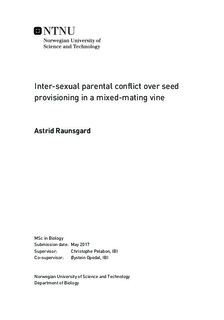Inter-sexual parental conflict over seed provisioning in a mixed-mating vine
Master thesis
Permanent lenke
http://hdl.handle.net/11250/2447532Utgivelsesdato
2017Metadata
Vis full innførselSamlinger
- Institutt for biologi [2573]
Sammendrag
1. Sexual reproduction creates an arena for inter-sexual parental conflict. When multiple paternity occurs, paternal plants are selected to exploit maternal plants for resources invested in their seeds, at the expense of seeds sired by other pollen donors, while maternal plants are selected to allocate resources equally among seeds. This may result in a coevolutionary arms race between the sexes over maternal investment. This arms race may be mediated by uniparentally expressed genes with opposite effects on seed growth (kinship genomic imprinting) or by selfish paternal alleles evolving to escape recognition by maternal growth-suppressing genes (interlocus contest evolution). Crossing populations with different mating systems can reveal inter-sexual conflict, either because populations have reached different equilibria in the arms race and/or due to the fixation of different alleles involved in the conflict.2. To test for the effect of mating system on hybrid seed size, I performed within and between-population crosses among four populations of the mixed-mating vine Dalechampia scandens (Euphorbiaceae), that differ in outcrossing rates. 3. When the paternal population was more outcrossed than the maternal population, hybrid seeds became larger than the seed size within the maternal population, and vice versa in the reciprocal cross. 4. The results support kinship genomic imprinting, that genes with antagonistic effects on seed growth have coevolved within populations, but that antagonistic forces acting on seed size are stronger in more outcrossed populations where inter-sexual parental conflict is expected to be more intense.
